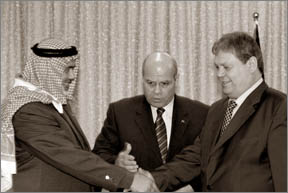|
observer |
|
|
|
|
|
OTHER LINKS |

|

|

|
Palestinian ceasefire starts taking hold
After a final burst of violence, a tenuous ceasefire began to take hold in the Gaza Strip early Tuesday after five days of intense fighting between the rival Hamas and Fatah factions left 34 people dead. The lull came just as Israel carried out its first response to a Palestinian suicide bombing, carrying out an air strike early Tuesday on a tunnel dug by Palestinians near the Gaza-Israel border. Previous truce deals between Hamas and Fatah struck in recent weeks of factional clashes have quickly collapsed, and it appeared unlikely the two sides would comply with all the terms of the current agreement, such as handing over all those involved in killings and abductions. In the past, Hamas and Fatah gunmen used such lull periods to prepare for the next round of fighting. The shaky truce deal, struck by Prime Minister Ismail Haniyeh of Hamas and a Rauhi Fattouh, an envoy of Palestinian President Mahmoud Abbas, came as a two-month ceasefire between Israel and the Palestinians was being jeopardized by a Palestinian suicide bombing, the first since April. The bomber, a 21-year-old from Gaza, struck the Israeli resort city of Eilat on the Red Sea on Sunday, killing three people and himself. Hamas, which controls the Palestinian parliament and cabinet, praised the attack as legitimate resistance, and Israeli leaders hinted that a military response was being considered. In Gaza City, gunfire and explosions were heard throughout the night, but the shooting stopped at about 5 a.m. local time, several hours after the ceasefire deal was struck. Foreign Minister Mahmoud Zahar of Hamas said the agreement stipulates that all security forces return to their bases, that suspects in killings are to be handed over, and that all hostages still being held - a number thought to be in the dozens - are to be released. He also said all roadblocks set up by the factions are to be removed. Fatah spokesman Maher Mekdad said his group would observe the agreement. "Despite all the bitterness and sadness that we are feeling, we will work to make it succeed," he said. During the fighting, both sides had set up roadblocks around the offices and homes of leaders, as well as in neighbourhoods they control. On Tuesday morning, Hamas had removed roadblocks from some areas, while security forces loyal to Abbas continued to block off some roads. The underlying cause of the fighting - a bitter power struggle between Hamas and Fatah, about equal in strength - has not been resolved. Coalition talks have broken down and appear unlikely to resume soon. Abbas, meanwhile, is determined to go ahead with calling early elections, a plan denounced by Hamas as a coup attempt. Both Saudi Arabia and Egypt have offered to mediate, and Abbas was to meet in Cairo on Tuesday with Egyptian President Hosni Mubarak. The Israeli military said the tunnel it bombed Tuesday was meant for use by militants for an attack against Israel. No casualties were reported. In the past, militants had dug such tunnels to attack Israeli army outposts and other installations. Israel observed a truce with the Palestinians in Gaza since late November, and the air strike appeared to signal that Monday's suicide bombing in Eilat - the first the town had seen - put that ceasefire in danger. Defence Minister Amir Peretz visited the scene of the suicide bombing in Eilat on Tuesday, promising to step up patrols along Israel's southern border to prevent similar infiltrations. "We will protect the citizens of Israel and we will protect the tourism centres of Israel," he said. "We will check all the means at our disposal in order to deal with the travel routes and also with the existing threats and also the infrastructure." |










